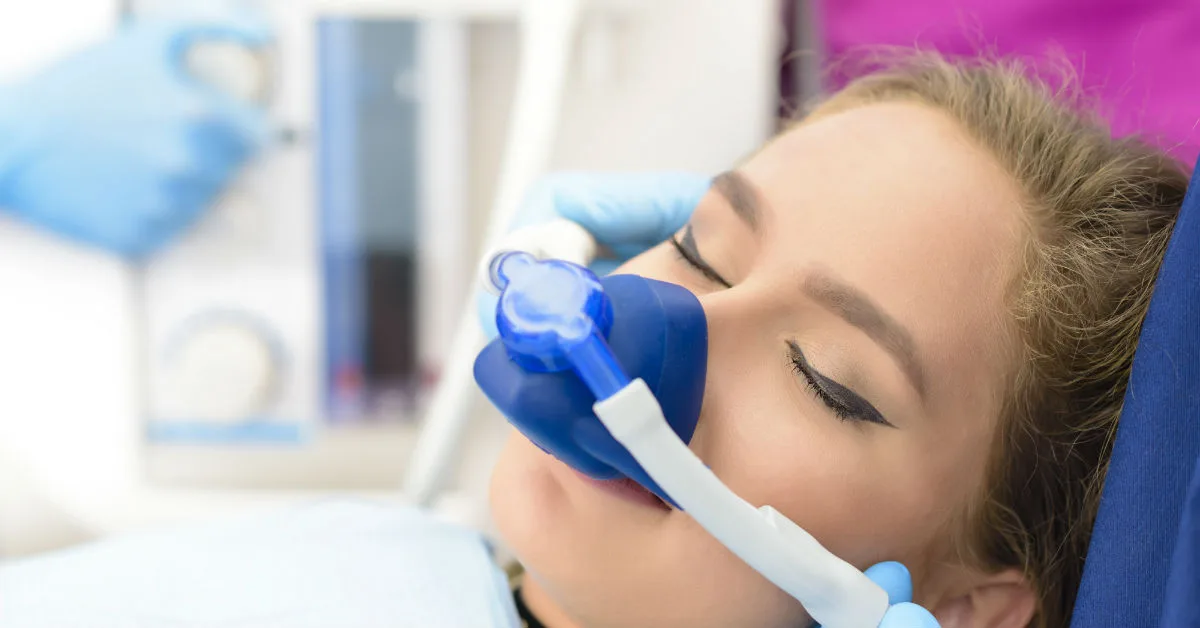
Pain radiating from your teeth rate very high on most people’s pain scales. To help prevent any discomfort or anxiety, all our dentists at Riverside Dental Care are trained in administering dental anesthetics. However, many of our patients have questions concerning dental anesthesia. Our dentists wanted to set the record straight and cover everything you need to know about dental anesthetics.
Types Of Dental Anesthesia
There are several types of dental anesthesia. Depending on the procedure and your personal needs, our dentists will vary which anesthesia they use.
- Topical anesthesia – A topical anesthesia is generally used to numb your gums and prepare them to receive an injection of local anesthesia. The topical anesthesia is usually a gel or cream our dentists will apply to the inside of your mouth. It can also numb the pain from oral sores. This type of anesthesia is usually used when preparing for cavity fillings and other dental procedures which will be using local anesthesia.
- Local anesthesia – This type of anesthesia stops the nerves from sending any signal to your brain, preventing you from feeling any pain. Once the site for the local anesthesia is numbed, our dentist will apply local anesthesia by injecting it. Along with using local anesthesia for cavity fillings, it is also used for other dental work like root canals and in conjunction with other types of anesthesia when oral surgery is required.
- General anesthesia – One of the strongest form of dental anesthesia, general anesthesia renders a patient completely unconscious. It can be applied using a breathing mask where the patient breathes in the gases or intravenously. This types of dental anesthesia suppresses the cardiovascular and respiratory systems, so it is not used for basic procedures and is reserved for procedures such as impacted wisdom teeth extraction or patients with severe dental anxiety.
- Nitrous Oxide – Often called “laughing gas”, nitrous oxide is a gas patients breathe in which allows them to relax through their procedure. Patients remain awake when using nitrous oxide as its use as an anesthesia is mostly to help dental patients disassociate from the dental procedure. It can be used in procedures ranging from cavities to cosmetic dentistry, depending on the anxiety of the patient.
- Oral premedication – Sometimes pain and/or anti-anxiety medications such as Ativan, Valium, or Halcion may be prescribed to be taken 30 minutes prior to a dental procedure. It has a similar role to nitrous oxide in that the medication will help an anxious patient feel more secure while our dentists work. The recommendation of oral premedication is highly patient dependent.
- Intravenous (I.V.) sedation – This kind of anesthesia is applied intravenously. While patients are sedated, they are not asleep. Instead, they remain awake but allowed to feel removed from their dental procedure. It is often used for wisdom teeth removal, oral surgery, and high anxiety dental patients.
Potential Side-Effects Of Dental Anesthesia
There are some potential side-effects when you use dental anesthesia. Most are temporary discomforts, especially as dental science progresses.
- Cottonmouth – Local anesthesia can cause your mouth to dry out. Drink plenty of water to flush the remainder of the anesthesia from your system.
- Hematoma – If a needle hits a blood vessel in your gums when receiving local anesthesia, you could develop a swollen spot on your gums which will become filled with blood. While uncomfortable, the hematoma isn’t dangerous and will disappear in a couple weeks.
- Bitten tongue/cheek – While your mouth is numb, you may bite down on your tongue and/or cheek too hard. Be sure to chew carefully if your mouth is still numb from anesthesia.
- Grogginess – General anesthesia and I.V. sedation can leave you very groggy. You will need to have someone else take you home so you can be safe as the anesthesia leaves your system.
- Cannot blink – Sometimes numbed nerves can leave you unable to blink for a short time. Your dentist can tape your eyelid down until the numbness wears off so your eye doesn’t dry out.
- Nerve damage – If the needle from local anesthesia strikes a nerve, you may suffer from temporary nerve damage. This is a rare occurrence and the damage should last between a few weeks to a couple of months.
- Death – In extremely rare circumstances, general anesthesia can cause death in young children under the age of 4 as the anesthesia depresses the cardiovascular and respiratory system in these small patients.
Our dentists are highly trained in administering dental anesthesias and have had years of successful work to hone their skills. Feel free to discuss with our dentists your anesthesia preferences and any concerns you may still have during your appointment.



Leave a Reply